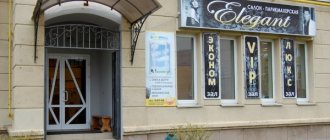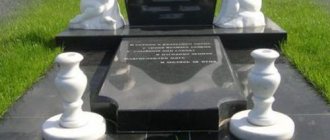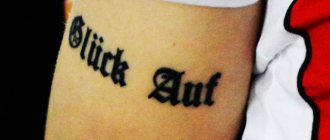Winged phrases and aphorisms in Latin
1. In words with two or more syllables, the stress is never on the last syllable.
2. In words with two syllables, the stress is on the first syllable: ró-sa [ro-za].
3. In words of three syllables, the place of stress is determined by the penultimate syllable:
a. If the penultimate syllable has a long vowel or diphthong, the stress is on the penultimate syllable: oc-cī-do [oc-cí-do], the-sáu-rus [the-sáu-rus]; b. If the penultimate syllable is short, the stress is placed on the third syllable from the end: lí-quĭ-dus [lí-quí-dus]; c. If the penultimate syllable has a vowel before two or more consonants, the stress is placed on the penultimate syllable: ma-gís-ter [ma-gis-ter]; d. if a vowel precedes a vowel in the penultimate syllable, the stress is placed on the third syllable from the end: ná-ti-o [na-tsi-o].
In words of Greek origin, whose formal features are the letters y, z and combinations of th, ph, rh, ch, sm the letter s between vowels is always read as [s]: hypophysis [gˣipophysis].
The sign ў denotes the non-syllabic sound [u].
The sign gx denotes the fricative sound [γ] ("gamma"), which corresponds to g in the Russian words vodi, aga, etc.
Names of Roman citizens
The name of a Roman citizen usually consisted of three parts:
1) a personal name (praenōmen),
2) a generic name (nomen gentīle),
3) a nickname (cognōmen). For example, Marcus Tullius Cicěro Marcus Tullius Cicero ('pea'), Publius Ovidius Naso Publius Ovidius Nazon ('nosey').
The son retained his father's generic name and nickname, but his personal name was sometimes changed; he could also be given another nickname.
Daughters were given the generic name of their father as their personal name. The father's name was Tullius, the daughter's name was Tullia, and the daughter's name was Julia. If a second daughter was born in the family, she was called Junior (for example, Julia Minor Julia Junior) or Second (Julia Secunda Julia Second), the next daughter was Third (Julia Tertia Julia Third). Cicero's daughter was called Tullia because her father's name was Marcus Tullius Cicěro.
The married woman was spoken of: Terentia Cicerōnis Terentia Cicero (meaning: Terentia [wife] of Cicero).
Britain and Rome
The first Roman contacts with the Britons date back to the first century B.C., when Caesar, during the wars in Gaul, made two campaigns to Britain (in 55 and 54). A century later, in 43 CE, Britain was conquered by the Romans and remained under their rule for nearly 400 years, until 407 CE. The English names of towns with the compound -chester or -caster (from the Latin castra a military camp) survived from this period, e.g., Manchester, Lancaster; -castle (from the Latin castellum a fortification), e.g., Newcastle;
foss- (from lat. fossa ditch), e.g., Fossway; coln-, col- (from lat. colonia settlement), e.g., Lincoln, Colchester. In the fifth and sixth centuries. Britain was conquered by the Germanic tribes of Angles, Saxons, and Jutes, who also brought there Latin vocabulary which they had borrowed from the Romans before moving to Britain. For example: Latin strata via paved road - German. Strasse, English street; Latin campus field - German. Kampf, camp. In the 10th century the Norman conquerors brought to Britain the French language, recall, "derived" from Latin (the Normans (lit. 'northern men') - the North German tribes of the Scandinavian countries;
having conquered in the early tenth century. The French were the most important part of the Northwestern region of France, which was therefore called Normandy, and they adopted French culture and French language.) Many Latin words entered the English language through French, for example: Latin palatium palace, French palais; Latin victoria victoria, French victoire, English victory; Latin autumnus autumn, French autumn, English autumn.
Alexander of Macedon
(born on July 20, 356 B.C. in Pella, died in Babylon on June 10, 323 B.C.) - the son of the King Philip II, one of the greatest ancient generals, creator of a huge empire. He was brought up by Aristotle.
After his father was killed in 336 BC, he became ruler of Macedonia (a region in northern Greece).
In 334 BC he made a campaign against Persians, then a campaign to Egypt, Mesopotamia, entering Babylon, conquering Central Asia, a campaign to India. After the end of the military campaign, Alexander the Great's possessions stretched from the Danube, the Adriatic, Egypt and the Caucasus to the Indus.
Alexander's sudden death at age 33 from illness prevented his plans to conquer Arabia and Africa.
School education in Rome
The Romans adopted the basics of Greek schooling and adapted them to their own conditions without much change.
Elementary schools where pupils were taught to read, write and count existed in Rome since III century B.C. At the secondary school they studied grammar (language and literature) and rhetoric (theory and practice of eloquence).
Music and sports were not typical in Rome. The mathematical disciplines did not play a significant role at the secondary level either and, as a rule, were not singled out as a separate subject.
At the highest level of education there were systematic classes in rhetoric and philosophy. Classes were bilingual: up to the age of 12, students attended classes in Greek language and literature, and then began to study Latin language and literature in parallel (until about the age of 17).
The Seven Liberal Arts In Ancient Rome, the Seven Liberal Arts (septem artes liberāles) were used to describe activities and exercises worthy of a free person, in contrast to activities that required physical labor, which only slaves were allowed to engage in.
Even in antiquity a list of disciplines, later called the liberal arts, began to be developed.
The understanding of certain sciences as an obligatory educational cycle was gradually formed in the writings of writers of late antiquity and the Early Middle Ages.
The number of free arts was limited to seven; they were arranged in a meaningful order that determined the levels of learning: the arts of speech (grammar and rhetoric), thought (dialectic), and number (arithmetic, geometry, astronomy, music).
The first cycle (of three learning sciences) was called trivium, the second cycle (of four) quadrivium.
The totality of the seven academic sciences was seen as a necessary preparatory stage for the philosophical knowledge of the world.
Helveti
The Helvetians were a Celtic people who migrated to Gaul. In 107 BC the Helvetians defeated the Romans, then settled between Lake Geneva and Lake Constance.
In 58 BC the Helvetians invaded southern Gaul, causing confusion in Rome. Caesar forced them back. From then on the Helvetic region (northwestern modern Switzerland) developed as a frontier bastion ('military fortification') against the Germans.
By the 2nd half of the 1st century AD. The Helvetians were Romanized. Since the 2nd century A.D. their name is no longer mentioned.
Nowadays, Helvetia is the Latinized name of Switzerland.
Roman weapons.
Weapons were divided into defensive - armor - and offensive. To the armor belonged: helmet of leather (galea) or metal (cassis), armor (lorīca) of metal, leather and cloth, protecting the body (special types of armor were scaly armor and chain mail); legs from ankles to knees were protected by greaves, for additional defense was a shield: oval (scutum), small round (clypeus) or semi-circular.
As offensive weapons were used: the sword (gladius), which was worn either at the waist or on a sling; the long spear, which was used in hand-to-hand combat, the short spear (pilum), which was used as a throwing projectile. Auxiliary units were armed with bows, arrows for which were placed in quivers, and slingshots that fired stones and lead balls.
The Germans and Rome
The Germans (Lat. Germāni) were a tribe that lived in the southern part of Scandinavia and central Europe, between the Rhine and the Vistula. At the turn of the first century BC - I century AD, the Romans waged wars against the Germanic tribes, trying to subdue them. Although these attempts were unsuccessful, economic ties were established that existed for a long time and led to the penetration of Latin words into the languages of the Germanic tribes.
Modern German adopted words from Latin, such as Tafel board (from the Latin tabŭla board), Insel island (from the Latin insŭla island), Wein wine (from the Latin vinum wine), Pforte gate (from the Latin porta gate, door).
In the Great Migration of the peoples of the fourth and fifth centuries, Western and Eastern Germans contributed decisively to the defeat of the Western Roman Empire, which fell in 476.
The Legend of Romulus and Remus
The mother of Romulus and Remus, Rhea Silvia, was the daughter of the legitimate king of Alba Longa (a city in the Latium region, southeast of Rome), Numitor, who had been removed from the throne by his younger brother Amulius. Amulius did not want Numitor's children to interfere with his ambitions; Numitor's son disappeared during a hunt and Rhea Silvia was forced to become a vestal (priestess of Vesta). In her fourth year of service, the god Mars appeared to her in the sacred grove, by whom Rhea Silvia bore two sons.
Angered Amulius ordered the infants to be placed in a basket and thrown into the Tiber River. But the basket with the children was washed ashore at the foot of Palatine Hill, where they were nurtured by a wolf, and the mother's worries were replaced by a flying woodpecker and a lapwing. Subsequently, all these animals became sacred to Rome.
Then the brothers were picked up by the king's shepherd, Faustulus. His wife, Akka Larentia, not yet comforted by the death of her child, took the twins into her care. When Romulus and Remus grew up, they returned to Alba Longa, where they learned the secret of their origins. They killed Amelius and reinstated their grandfather Numitor to the throne.
Four years later Romulus and Remus set out for the Tiber to find a place to establish a new colony of Alba Longa. According to legend, Remus chose the lowlands between the Palatine Hill and the Capitoline Hill, but Romulus insisted on founding the city on the Palatine Hill. Appealing to omens did not help, a quarrel broke out during which Romulus killed his brother.
Romulus, repenting Remus's murder, founded a city that he named Roma and became its king. The date of the founding of the city is thought to be 753 B.C.
About Roman Slaves.
Serves (lat. servi) is the common name for Roman slaves. In ancient times their number was small, later noble families had them in great numbers. Slaves were divided into urban and rural. Slaves were divided into three classes according to their position and occupation:
Ordinarii . ('chiefs') - marked by the lord's trust. They were entrusted with the supervision of the household, treasury, etc.; they had their own slaves to assist them. Above all there was a slave who was in charge of the property and estates. Next came the overseer, then the treasurer, head of provisions, slaves who handled the lord's commercial affairs in the country, slaves with scientific and artistic education: those who attended to the building and decoration of the house; those who supervised the library, works of art and correspondence of their lord; tutors for children and household doctors; slaves for entertainment: musicians, gladiators, actors, acrobats, jesters (ugly midgets).
Vulgāres ('servants') performed black work inside and outside the house: the gatekeepers and those who reported guests, the numerous slaves who followed the master when he went out, the porters, the footmen; at home worked those who took care of the master's table, closet, hairstyle, etc.
Mediastīni ("laborers") were the lowest class of slaves; they chalked, cleaned, and did other similar work. This category also included bath slaves and slaves who prepared the body of the deceased for burial.
The Oracle of Delphi
The oracle was a place where the answer to a question from the deity was obtained. The Delphic Oracle was located at the temple of Apollo in Delphi. According to Greek mythology, it was founded by Apollo himself on the site of his victory over the monstrous serpent Python. The Oracle of Delphi, whose head was the Pythia ('priestess'), was one of the major oracles in the Hellenic world.
The prediction itself, given by the Pythia, was also called an oracle. The pythia, sitting on a tripod, inspired by Apollo and in a state of ecstasy, reported predictions which the priest translated into verse form.
The flowering of the Delphic oracle dates back to the 6th-5th centuries BC, when it mediated in inter-political conflicts. It was customary to apply to the Oracle for all important questions of state and private life. From many kingdoms of the ancient world embassies with rich gifts rushed to Delphi.
The Delphic oracle gave information on cultic matters (including colonization), established the redemptive punishment for the purification of the spilled blood, and gave advice on legislation.
Newly drafted constitutions received his sanction. Delphi resorted to arcane or ambiguous language when answering questions about future political events.
The weakening of the temple's influence began with the Greco-Persian wars, when Delphi sided with the Persians, hoping to become the religious center of the Persian empire. During Roman rule, the temple housed monetary deposits from various parts of the Mediterranean.
The temple was repeatedly plundered, burned during the invasion of the Gauls in 279 B.C., and under Emperor Theodosius (391 A.D.) it was finally closed.
Champ de Mars
The Field of Mars (lat. Campus Martius) was the name of a part of the city of Rome on the left bank of the Tiber River, originally intended for military and gymnastic exercises.
From the time of the Tarquiniae (end of the 6th century B.C.; the last king of ancient Rome, Tarquinius the Proud, of Etruscan descent, reigned in 510-509 B.C.) the military and civic meetings were held here. As a place for military exercises, the field was dedicated to Mars, the god of war.
In the center of the field was the altar of Mars. This place remained free and was later called Campus, while the rest of the fields were built up.
By analogy with Rome, in German and French cities special squares were created for military parades (such a square is still called Champ de Mars in French).
There is a square called Champ de Mars in St. Petersburg.







